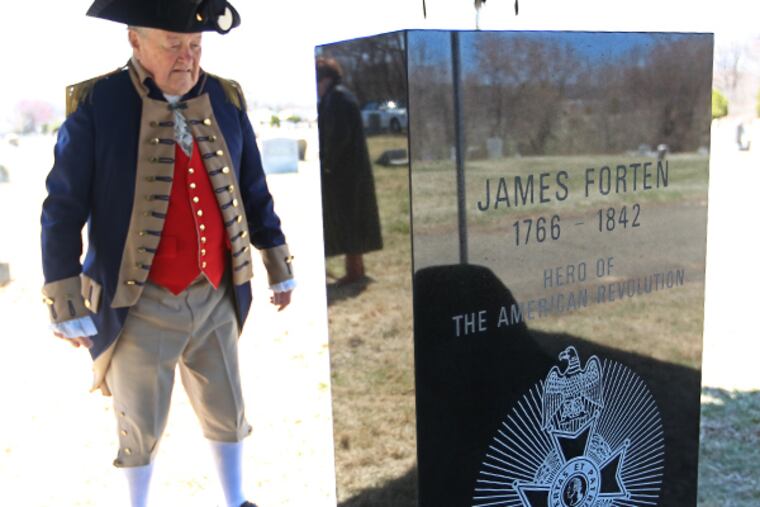James Forten first black man to be honored as hero of the American Revolution
PHILADELPHIA James Forten's life was one of the most remarkable in Philadelphia history. On Sunday, 248 years after his birth, he became the city's first black man to be identified and honored for his service in the Revolutionary War.

PHILADELPHIA James Forten's life was one of the most remarkable in Philadelphia history. On Sunday, 248 years after his birth, he became the city's first black man to be identified and honored for his service in the Revolutionary War.
Joseph W. Dooley, head of the Sons of the American Revolution, called him "a hero of the American Revolution, truly a great man whose life was dedicated to freedom for all Americans."
Born free, Forten was a sailor, sailmaker, and antislavery activist who became one of the wealthiest Philadelphians of his day, black or white.
In 1832, his fortune was estimated at $100,000.
To honor Forten's role in the Revolutionary War, a headstone was unveiled in a ceremony at Eden Cemetery in Collingdale, the Delaware County site his third and perhaps final resting place.
Forten was born in 1766 in Philadelphia. As a boy, he worked as an apprentice sailmaker. In July 1776, hearing the Liberty Bell ring, he joined others at Independence Square for the first public reading of the Declaration of Independence, according to biographer Julie Winch, a professor at the University of Massachusetts, Boston.
He believed the document applied to all Americans, not just whites, and, when the Revolutionary War began, Forten volunteered on privateering ships that attacked British merchant vessels, said Winch, who spoke at Sunday's ceremony.
In 1781, his ship was captured by the British Navy. The captain of the British ship had a son on board and quickly sized up Forten, his 15-year-old prisoner, as someone who would be a good companion for and influence on his own child, Winch said.
After several weeks, the captain offered to take Forten back to England, look after him, and see that he got education and opportunity. He saw great character and promise in the teenager. For Forten to have a British naval captain in his corner would have been a tremendous asset and advantage in life, Winch said.
All Forten had to do was change sides. But he wouldn't.
"He signed up for the cause of independence, and he wouldn't betray it," Winch said.
Forten spent seven months on a British prison ship. His family thought he had died. But eventually he was freed, returned to Philadelphia, and took over a sailmaking business.
It might have been much easier for him, and better for business, had he not been so openly opposed to slavery, Winch said.
But that was not who he was.
Before a ceremony could be held and a monument erected in honor of Forten's service to his country, his grave had to be found.
A member of the African Episcopal Church of St. Thomas, Forten was buried in 1842 at its original site at Fifth and Adelphi Streets. But when the church was sold, his remains, along with others in the church cemetery, were moved to South Philadelphia. When that property was bought his remains were moved again.
Through research, Marion T. Lane, once a member of the African Episcopal Church of St. Thomas and also descendant of a black Virginian who served with George Washington at Valley Forge, learned the remains of Forten and others were in a mass grave at Eden Cemetery.
That finding and Winch's biography were largely what made Sunday's ceremony possible.
"There are many, many African American patriots," Lane said, "but history books have left them out."
215-854-5639
@michaelvitez